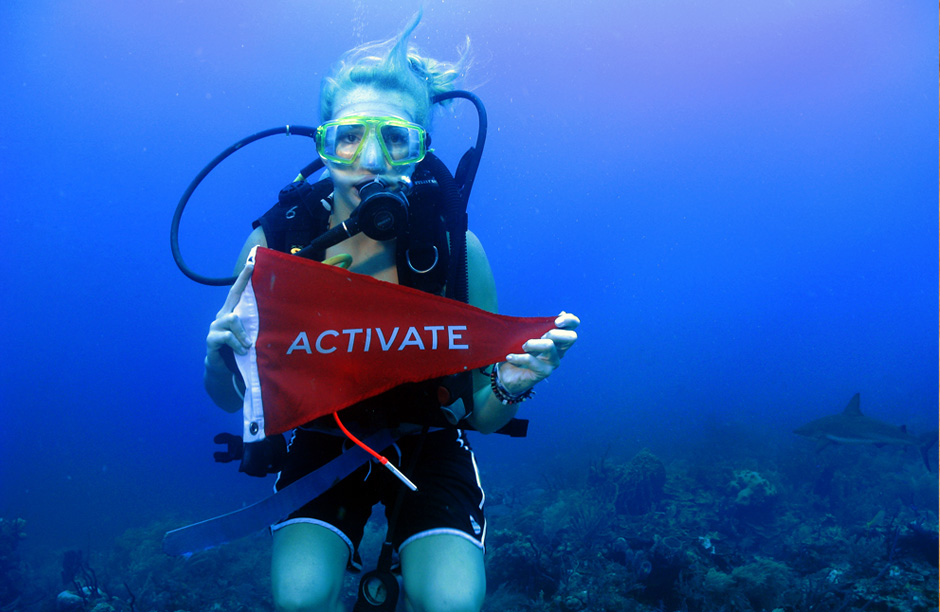PROJECT
Flag #12: Honduras
Location: Roatán, The Bay Islands, Honduras
Name: Maja Zonjic (In the background: Gray Reef Shark)
Words: by Maja Zonjic
Photograph by: Ian Drysdale
The oceans are the most important ecosystem on the planet, containing life that absorbs most of the carbon dioxide – that we put into the atmosphere – and converting it into the oxygen we breathe. Sharks play a crucial role in the oceans – as apex predators, they are critically important to the fragile balance of the world’s oceans as they keep populations of other fish healthy and in proper proportion for their ecosystem. Recent studies indicate that regional elimination of sharks can cause disastrous effects further down the food chain including the death of coral reefs and the collapse of fisheries. Alarmingly however, sharks face numerous threats that have already had a devastating impact on their population numbers – most notably – unsustainable overfishing. This includes; accidental bycatch, unregulated fishery quotas, lack of legal protection or enforcement for Threatened species, and illegal (and in some cases, legal) practice of shark finning to satisfy the growing demand for Shark Fin Soup.
A recent IUCN report noted that 1 in 3 species of open ocean sharks are Threatened with extinction, or listed as Critically Endangered, Endangered, or Vulnerable. For many of these species, the population numbers continue to plummet – some by as much as 98% in the last century alone. For many shark species, the ICUN lists “shark finning” as one of the leading causes of population decline. Concurrently, some of the species at greatest risk are those that are highly prized in the shark fin trade, including; the Great, Scalloped and Smooth Hammerheads, Oceanic Whitetips, and Great Whites just to name a few. A 2006 analysis by Dr. Shelley Clarke estimated that there are between 26 and 73 million sharks killed each year for the fin trade. Due to a lack of regulation, laws and enforcement in some countries but not others, it is nearly impossible to discern which fins are ‘legally’ obtained and in some cases, from which species.
Additionally, numerous studies have shown that on a strictly financial level, sharks are by far more valuable alive than dead. Separate studies in Australia, the Maldives, Belize, Palau, South Africa, the Bahamas, and Honduras, all indicate that revenue from shark diving significantly surpasses potential shark fishing revenue. In premier shark diving destinations, a single shark can attribute upwards of a million dollars over its’ lifetime to the local economy, as opposed to a one-time profit of a couple of hundred dollars if it is caught and sold. Through my own research, I have seen first-hand the positive effects behind the creation of shark sanctuaries and education-based shark awareness programs.
The Shark Legacy Project was started in 2009 with an objective to estimate the true value of sharks, as both an ecological, and an economical asset to the local communities of Honduras. Giacomo Palavicini, who works for the Shark Legacy Project, has noted an individual Caribbean Reef shark brings in $47,000 per year to the local economy through dive tourism, multiplied by the shark’s age. He also noted that there are additional financial benefits to the tourist-serving properties, such as hotels and restaurants, not included in this estimate. Moreover, incidental sightings of other shark species, including the Oceanic Whitetips and Hammerheads also bring in additional revenue.
Despite these staggering figures, global protection for sharks is still unrealized. At the current rate of destruction, sharks are not a renewable resource and stricter measures need to be taken to ensure the survival of the various species world-wide. It begins by changing our mindset to recognize the importance of sharks to our oceans, and in doing so, to start respecting and protecting them.
Special thanks to:
Ian Drysdale, Healthy Reefs for Healthy People Initiative
Giacomo Palavicini, Shark Legacy Project
Waihuka Divers
For more information:
http://www.healthyreefs.org/cms/
http://www.facebook.com/pages/Shark-Legacy-Project/276492206568
www.postcards-from-utila-film.com
